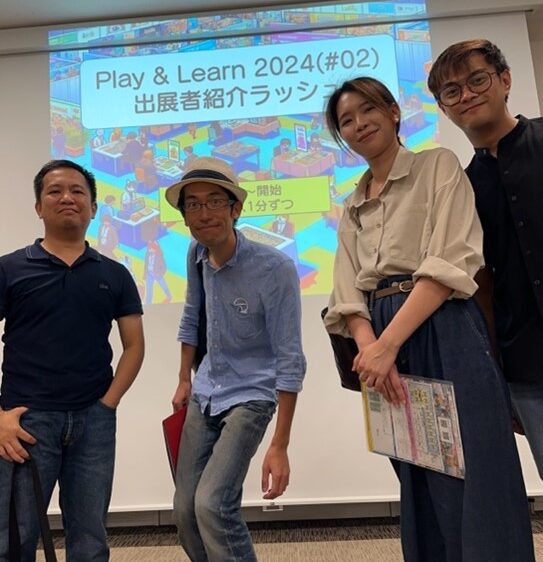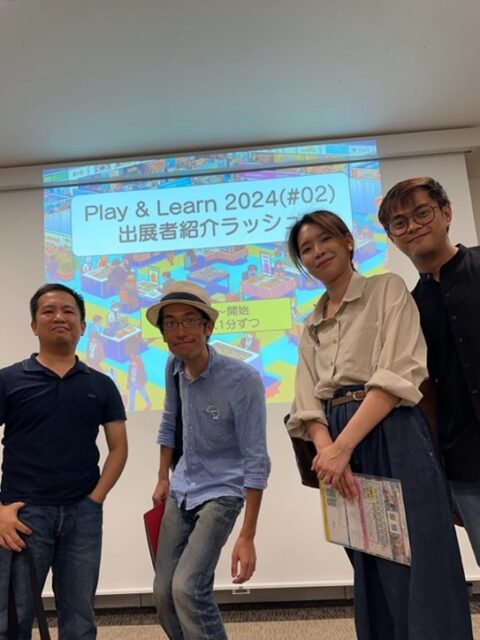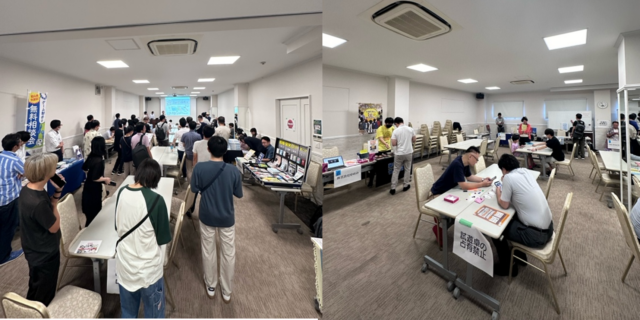
SKY Project Members attended the Play & Learn 2024 #2 in Yokohama, Japan2024.09.24 Mark Kenneth Camiling East Asia

Members Emmanuel Estrellado, Pimmada Charoensilp, Mark Camiling, and Masafumi Konda represented the SKY Project at the Play & Learn 2024 #2 in Yokohama, Japan. Play & Learn is a one-day gathering of exhibitors from all over the country whose aim is to feature and market their board games /services. A total of thirty exhibitors participated in the event.

The day started with a tour around the booths of various participating board game creators from different business and educational institutions. As each booth is visited, the SKY Project Members listened to the featured game’s elements and mechanics.
Several board game themes were observed. Among these are:
- parenthood and family life
- psychology, wellness, and work-life balance
- eco-lifestyle
- media production
- energy conservation
- language learning
- food production and service
- artificial intelligence and augmented reality
- arts and performance
- business management
As the morning session ended, the attendees were asked to gather for a pitching session. Each participating company was given one minute to present their ideas and events.
In the afternoon, the SKY Members came in pairs to four different workshops:
a. Workshop for amateur game creators
There were four games featured by amateur the creators. Two of which were played by the workshop participants. The first game is called “第3の命題” (unoffcial translation: Third Proposition), inspired from “Aufheben”, a word coined by the famous philosopher, Hegel. One player shows two propositions in conflict with each other, such as We should give some allowance to children. and We should not give allowance to children. Other players come up with their answers, using factual or humorous language, and solve the conflict. This game challenges the individual’s philosophical sense. In the second game, one player becomes a “lost house cat,” while others become “seeking family members.” The lost cat moves through the map randomly, and the family does not know where it is exactly. Hence, they gather hints. For both games, the creator wanted to emphasize the game balance and sophistication.
b. Workshop on board games about generative AI and future dialogue
The workshop featured the game,“ダリの”め“” (unofficial translation: Dali’s Eyes), designed and produced by students at Rikkyo University. The game involves players divided into groups of 3-4 members. They will discuss among themselves an AI-generated image. From then, a task will be revealed, and the group will generate prompts to feed the AI image generator application. After which, the generated image is presented and explained among all game participants. Each team is given an opportunity to comment and ask questions. This game aims to enhance communication and creativity among the players.
c. Game training on deepening self-understanding and mutual understanding among team members.
The workshop featured the game, “パシリの流儀” (unofficial translation: The (Errands) Runner’s Style). Espousing a bakery theme, the game requires a team to fulfill the bread orders while taking into consideration the conditions required by the cards drawn. It aims to simulate and develop skills necessary to successful job-hunting experiences and work habits.
d. Workshop on business game experience, featuring an organizational development DIY kit.
The main game is called“ウツ会議” (unofficial translation: Depression Conference), a cooperative activity to help a person with depression recover. Each player takes different roles such as a doctor, counselor, supervisor at work, bartender, and the patient themselves. They play the Care Card to relieve mental stress described in the Mental Stress Card. The plural Mental Stress Cards are arranged to form a tower to represent the realistic situations in the patient. In this game, players can realize the importance of collaboration in giving aid to a person in need. An enriching discussion occurs after playing the game.
This activity is part of the SKY Project’s initiatives on retooling and enhancing the members’ skills in incubating ideas for game design and production. With the invaluable lessons gained from activities like this, the team will be able to design effective and enjoyable games and game-based trainings for skills development in various sectors.
To learn more about the Play & Learn Exhibition, you may visit the event page: https://playandlearnevent.com/








Notes:
*The SKY Project Members carried out unofficial translations of the game names
**Permission was secured to take pictures of the game boards.


